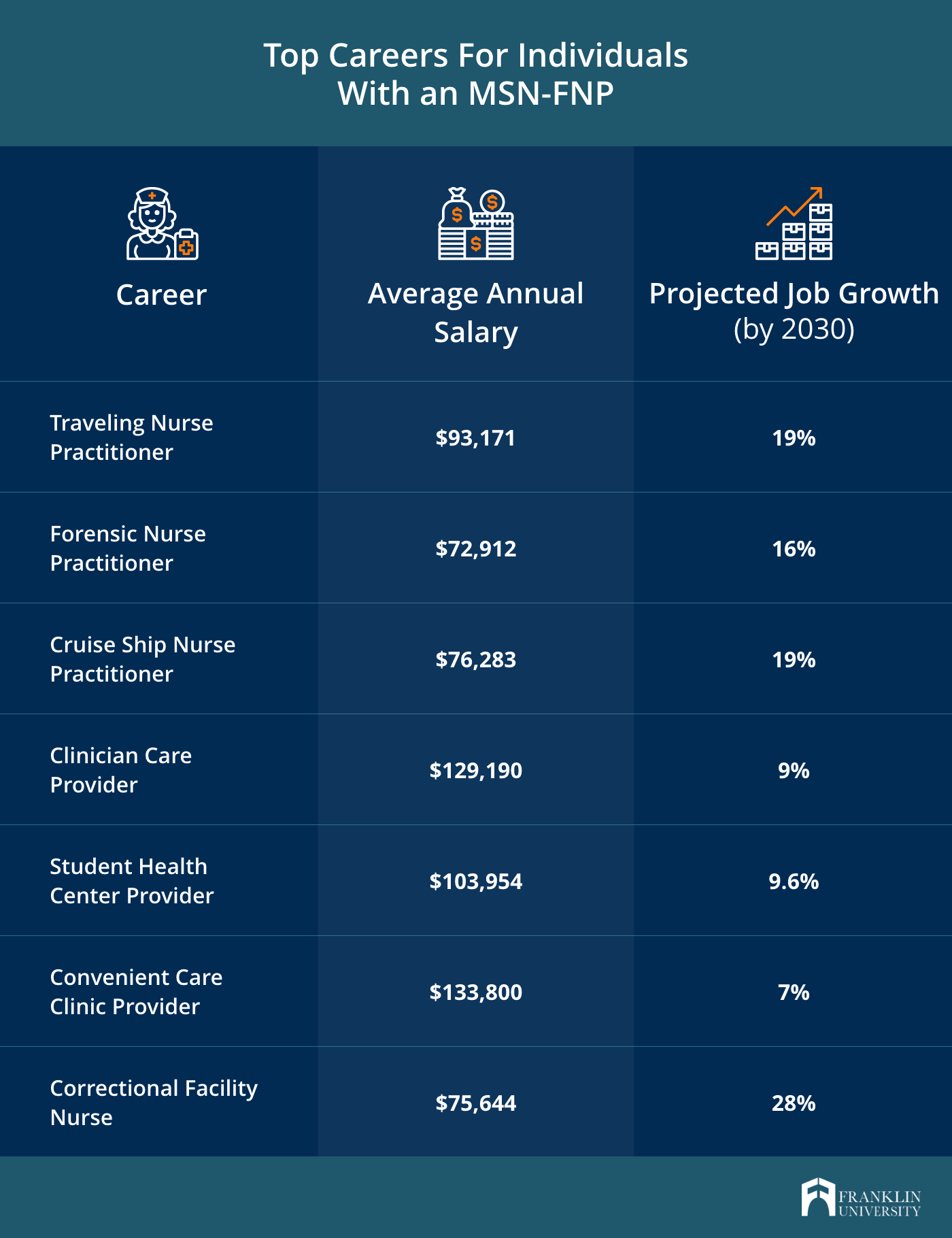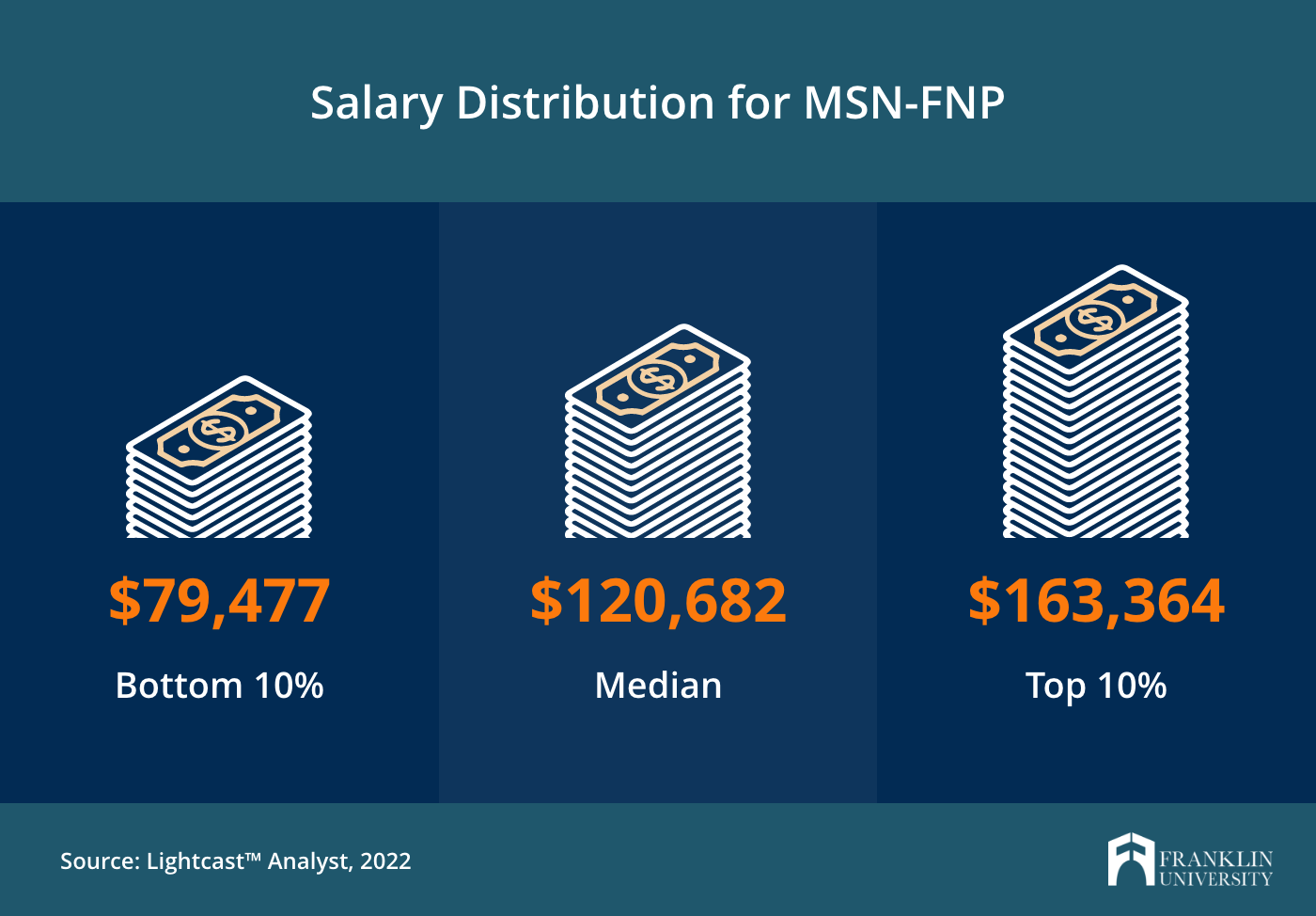Request Information
We're Sorry
There was an unexpected error with the form (your web browser was unable to retrieve some required data from our servers). This kind of error may occur if you have temporarily lost your internet connection. If you're able to verify that your internet connection is stable and the error persists, the Franklin University Help Desk is available to assist you at helpdesk@franklin.edu, 614.947.6682 (local), or 1.866.435.7006 (toll free).
Just a moment while we process your submission.

Is an MSN-FNP Worth It?
An argument could be made that in the next 10 years family nurse practitioners (FNPs) will be the lynchpin of the American healthcare system. According to The U.S. Bureau of Labor Statistics the fastest growing profession in the United States will be nurse practitioners. The expected job growth for FNPs alone is projected by Salary.com to be 36% by 2032.
Many RNs are returning to the classroom to obtain a Master of Science in Nursing (MSN). But before an RN starts down a degree track they will inevitably ask themselves one question: Is pursuing an MSN-FNP worth it?
This article will explore the pros and cons of pursuing an MSN-FNP degree.
Is MSN-FNP Phasing Out?
As nurse practitioners play a greater role in healthcare delivery, the education requirements for these roles are seeing a shift.
“For the past 20 years, numerous nursing organizations have endorsed the Doctor of Nursing Practice (DNP) degree as the entry-level for Advanced Practice Registered Nurse (APRN) practice,” says Jennifer Van Winkle, DNP candidate, MSN, ACNP-BC, FNP-BC, chair of Franklin University's FNP, MSN-Generalist and MSN-Nurse Administrator programs. “Transitioning to a DNP degree as a new standard ensures that APRNs are equipped to manage complex clinical situations, recognize issues in healthcare delivery and work on quality improvement to improve patient care outcomes.”
Still, Van Winkle says, an MSN-FNP degree should not be discounted by nurses seeking higher levels of educational attainment.
“The Master of Science in Nursing (MSN) degree is still a valid option,” she says. “Students can still obtain a master's degree and become licensed to practice in one of four APRN roles. Students that choose to start with an MSN degree have the option to continue their education later and pursue a DNP degree.”
MSN-FNP - What’s The ROI?
According to U.S. News & World Report, the average cost of an MSN-FNP degree is $50,000. But going after this degree isn’t just a financial investment, it’s also an investment of time, effort and passion. Before making these investments it’s good to stop and consider the ROI (Return on Investment).
The ROI will be different for each student and driven by a number of factors. It could be about the cost of the degree vs. earnings over time. (The average median salary for this role according to Lightcast™ data is $120,682.) Or you can measure ROI through the skills you’ll gain in the degree program vs the time spent in class.
“When considering the ROI of pursuing an MSN-Family Nurse Practitioner degree, the cost of education versus the earning potential is only one of the factors to consider," Van Winkle says. "NPs earn a higher salary than RNs, and they have greater autonomy and opportunities for career growth. Making a difference through providing family-focused holistic, evidence-based care is the core of what FNPs do."
7 Top Careers for MSN-FNP
Here are 7 careers to consider with an MSN-FNP degree.

Get a FREE guide to help you advance your career, featuring helpful advice and thoughtful insights from nursing experts.
1. Traveling Nurse Practitioner
The need for traveling nurses really came to light in 2020 as areas were being overwhelmed by the COVID pandemic and calls went out for healthcare support. Traveling nurses have a tremendous amount of flexibility and freedom to select when and where they want to work.
2. Forensic Nurse Practitioner
CSI. NCIS. Quincy. Popular entertainment shines a strong light on this unique nursing role. The responsibilities are straightforward — you’ll work with law enforcement and other medical professionals to evaluate victims and gather medical evidence. It’s a role that combines medical, detective and advocacy work.
3. Cruise Ship Nurse Practitioner
It’s a traveling nurse position, but to the extreme as you’ll be providing care around the world. Yes, you’re bound to get some beach time but in this role you’re also constantly on-call. You’ll need to be quick thinking and resourceful as you’ll treat “common” illnesses and those that come from exposures in the regions the ship visits.
4. Clinician Care Provider
Because of their unique skills and practice ability, FNPs are particularly suited to provide treatment and care in individual clinics. These clinics can be in populated areas or in rural locations where they offer the only care across multiple counties. Serving the underserved is an important responsibility for nurses in these practice settings.
5. Student Health Center Care Provider
Mid-to-large universities often have a health center where they provide for the basic medical needs of their students and staff. Nurses in these roles perform exams, prescribe medications, order labs, provide vaccinations and can help with drug and alcohol abuse issues.
6. Convenient Care Clinic Provider
Retailers and pharmacies have added in-store, “Quick Care” medical services for customers. Working in this space, you would be providing on-demand care to a wide range of patients.
7. Correctional Facility Nurse
Nurses in correctional facilities provide scheduled care and see acute patients. FNPs in a correctional setting need to be versatile, focused and reactive.
“FNPs are trained to provide care throughout life, from birth to the end-of-life — FNPs practice in various settings, including clinics, urgent care, school settings and hospitals. While FNPs treat illness and diseases, their primary goal is to help patients achieve optimal wellness through health promotion, illness prevention and patient education,” Van Winkle said.
5 Reasons It's Worth It To Earn an MSN-FNP
There are any number of reasons that may compel you to pursue an MSN-FNP. Some may be personal and others more practical. Here are five of the more popular reasons people pursue this degree.
1. Increase patient interactions
With an MSN-FNP you can gain a certain degree of autonomy when it comes to patient care. Depending on where you are practicing, you may even be able to move away from needing physician supervision and be able to practice independently.
2. Boost earning potential
The median salary for this role according to Lightcast™ data is $120,682. Those in the bottom 10% make $79,477 annually while the top 10% average $163,364.
3. Increase the ability to provide specialized care
One of the benefits FNPs offer to the healthcare community, and one of the things that so many practicing FNPs love about their job, is that they can provide care to a wide patient pool. Over time, FNPs may develop a special affinity for helping a certain patient population or treating a segment of multiple patient populations who all have the same care needs.
An MSN-FNP program provides a nurse with the ability to focus on that area of care so that it can become their practice area post-graduation.
4. Expand your role in patient care
An MSN-FNP allows you to expand your role in patient care with newly earned clinical knowledge, critical-thinking abilities and problem-solving skills.
5. Open the potential for new jobs
With an MSN-FNP, the job outlook is extremely positive. And it’s a national need. That means with your MSN degree and FNP certification you’ll have a wide pool of available jobs to consider. And you’ll broaden the types of jobs and practice settings where you can actively practice.
3 Reasons an MSN-FNP May NOT Be Worth Pursuing
Every situation is different and it’s important to consider all the pros and cons around pursuing an MSN-FNP before making the commitment. The three most common reasons that someone doesn’t enroll in an MSN-FNP degree track are:
1. You’re not sure what specialization path you want to choose
FNPs have an opportunity to specialize in the care that they provide and earning their MSN prepares them for that. There are some nurses who prefer to work across disciplines.
2. You aren’t sure if you want to spend a career in the field
If you’re happy in your career and don’t see yourself doing anything differently, then an MSN may not be what you need. You can certainly continue to provide the kind of care you enjoy right up to retirement.

3. You don’t want the legal responsibilities of more advanced roles
As an FNP you’ll have responsibility for reviewing medical records, ordering tests, managing prescriptions and of course setting a care plan. It’s a holistic level of care that some nurses shy away from because it leaves them open to legal repercussions.
Controlling Your Career
You’ll want to pursue your MSN-FNP at a university that offers what you need from an education standpoint and what you want for a school/work/life balance.
To meet those needs, Franklin University offers a flexible MSN-FNP degree program led by working nurses with deep expertise and hands-on experience in the field.
To start your MSN journey, explore Franklin University’s MSN-FNP admission requirements and program specifics to see how you can take the next step in your nursing career.





